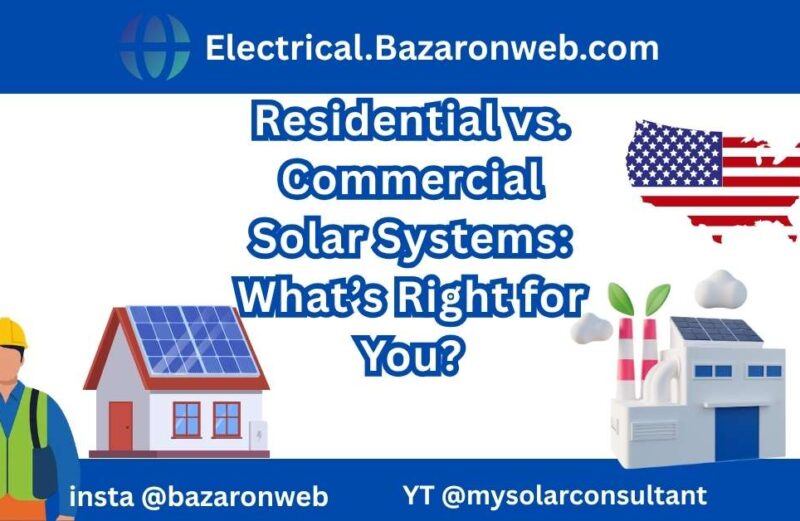By Sudeep S
Senior Electrical Engineer | Solar Expert | Electrical Consultant (25+ Years Experience)
With solar power becoming more affordable and accessible than ever before, both homeowners and business owners across USA and the world are exploring ways to cut energy costs and move toward cleaner, more sustainable electricity. But one key question often comes up: What’s the difference between residential and commercial solar systems — and which one is right for you?
As someone who has designed and installed solar systems for both homes and large commercial spaces for over two decades, I’m here to help you understand the core differences, benefits, and ideal use cases for each.
🏠 What is a Residential Solar System?
A residential solar system is designed specifically for homes — whether it’s an independent house, villa, or even an apartment with rooftop access. These systems are typically smaller in size and capacity and are tailored to meet a household’s energy requirements.
Key Features:
- Capacity: 1 kW to 10 kW (average home uses 3–5 kW)
- Location: Rooftop-mounted (usually sloped or flat roofs)
- Usage: Powers lights, fans, appliances, air conditioners, and sometimes water pumps
- Ownership: Owned and maintained by the homeowner
- Connection: Grid-tied, off-grid, or hybrid systems with or without battery storage
Benefits:
- Reduces monthly electricity bills significantly
- Can work with net metering to sell excess energy back to the grid
- Increases property value
- Helps meet sustainability and green building goals
🏢 What is a Commercial Solar System?
Commercial solar systems are large-scale setups installed at commercial properties like offices, factories, hospitals, schools, showrooms, and warehouses. These systems are designed to support much higher energy demands and often include advanced monitoring and energy management features.
Key Features:
- Capacity: 10 kW to 1 MW or more
- Location: Rooftop, ground-mounted, or carports
- Usage: Powers machinery, HVAC systems, computers, lighting, and large equipment
- Ownership: Owned by the company or installed under Power Purchase Agreements (PPAs)
- Connection: Usually grid-tied; batteries optional depending on energy strategy
Benefits:
- Massive savings on commercial electricity tariffs
- Faster ROI due to high consumption and tax incentives
- Enhances brand image as an environmentally responsible business
- Eligible for accelerated depreciation and other government benefits
📊 Residential vs. Commercial: Key Differences
| Feature | Residential Solar | Commercial Solar |
|---|---|---|
| System Size | 1–10 kW | 10 kW – 1 MW+ |
| Installation Site | Home rooftop | Industrial rooftop or ground |
| Cost (approx.) | ₹60,000 – ₹1.5 lakh per kW | ₹40,000 – ₹80,000 per kW (bulk rates) |
| Design Complexity | Simple | More complex (load balancing, 3-phase integration) |
| Return on Investment | 5–7 years | 3–5 years |
| Regulatory Process | Easier permits | More documentation and compliance |
| Uptime Requirements | Moderate | High uptime and reliability essential |
| Monitoring | Basic app monitoring | Advanced monitoring and analytics |
🔋 Power Backup & Storage
Both residential and commercial systems can be installed with or without batteries:
- Residential systems often use hybrid inverters with battery support to provide backup during power outages.
- Commercial systems generally remain grid-tied to avoid the higher costs of large-scale battery storage but may include batteries for critical load management or peak shaving.
🏛️ Government Incentives
Both types of systems are eligible for subsidies and incentives:
- Residential Solar:
- Central subsidy (under PM Surya Ghar Yojana, for example) — up to 40% for smaller systems
- State-level incentives and net metering policies
- Commercial Solar:
- Accelerated depreciation benefits (up to 40% in Year 1)
- GST input credit and custom duty exemptions for certain components
- No central subsidy, but high savings and tax benefits offset it
✅ Which One Is Right for You?
Ask yourself these questions:
For Homeowners:
- Do you want to reduce household electricity bills?
- Do you experience frequent power outages?
- Do you have enough rooftop space?
- Are you eligible for net metering in your state?
If yes, a residential solar system with 3–5 kW capacity is likely perfect for you.
For Business Owners:
- Are your monthly energy bills eating into your profits?
- Is your building’s roof unused or underutilized?
- Do you want to reduce your carbon footprint and impress eco-conscious clients?
- Are you looking for a strong ROI and tax benefits?
Then a commercial solar solution could be a game-changing investment.
💬 Insights from Sudeep Srivastava
From compact 2 kW home systems to 200 kW factory installations, I’ve worked on solar projects of every scale. Here’s my advice:
Start by evaluating your current energy usage, available roof space, and long-term goals. Every system I install is custom-designed — no two sites or consumption patterns are the same.
Whether you’re a homeowner or a business owner, solar is no longer a luxury — it’s a necessity in today’s energy landscape.
📞 Need Help Deciding?
If you’re unsure about your solar needs, I’d be happy to guide you. From system sizing and layout to installation and after-sales support, I provide end-to-end consulting and reliable service.
Let’s make your home or business smarter, cleaner, and more energy-efficient with the power of the sun.

